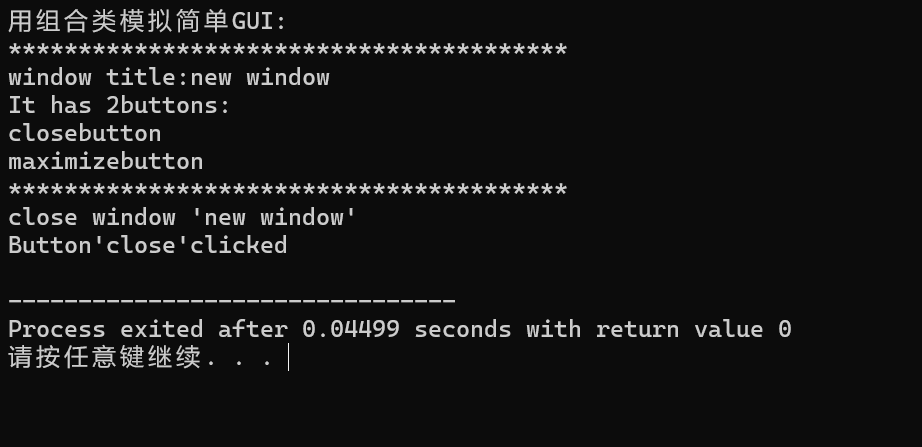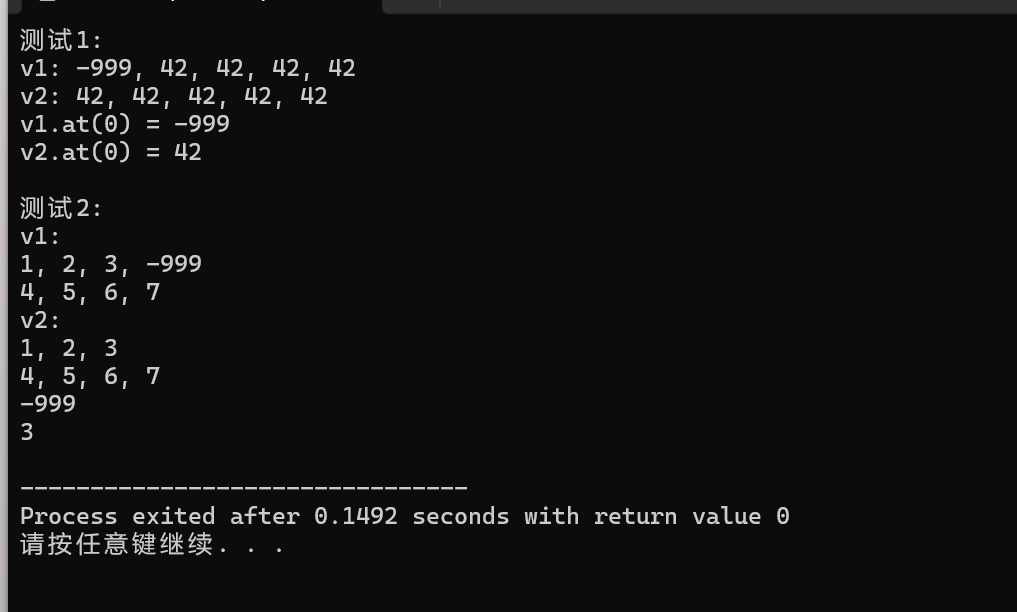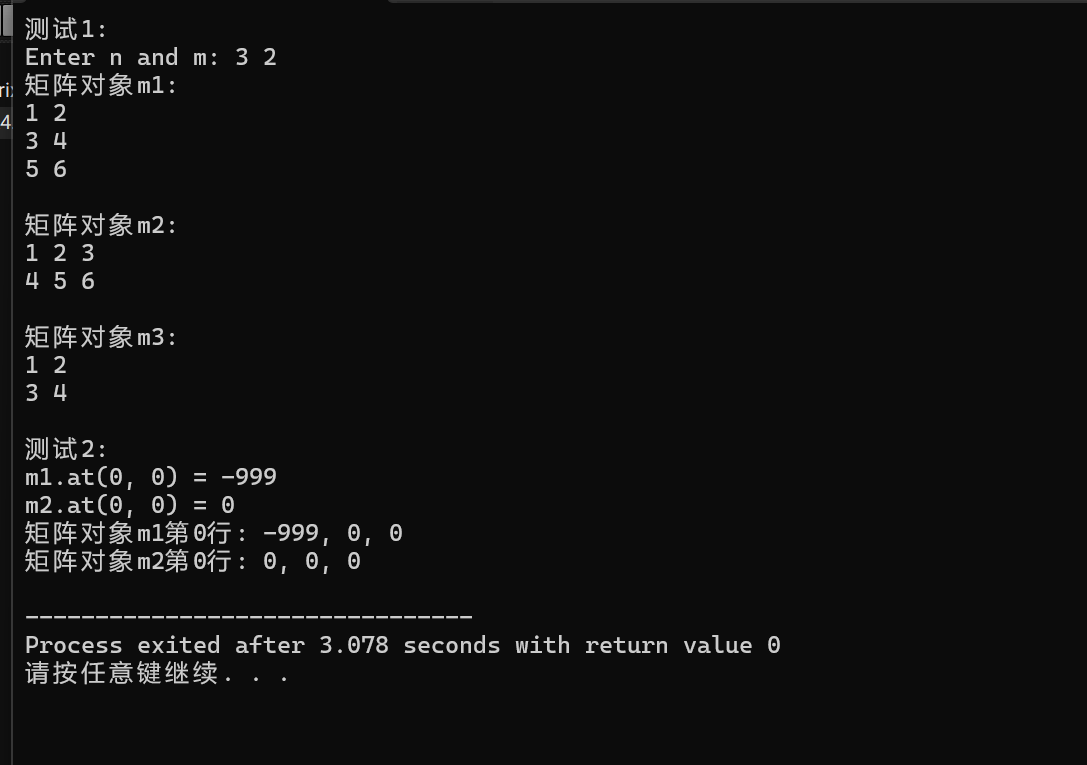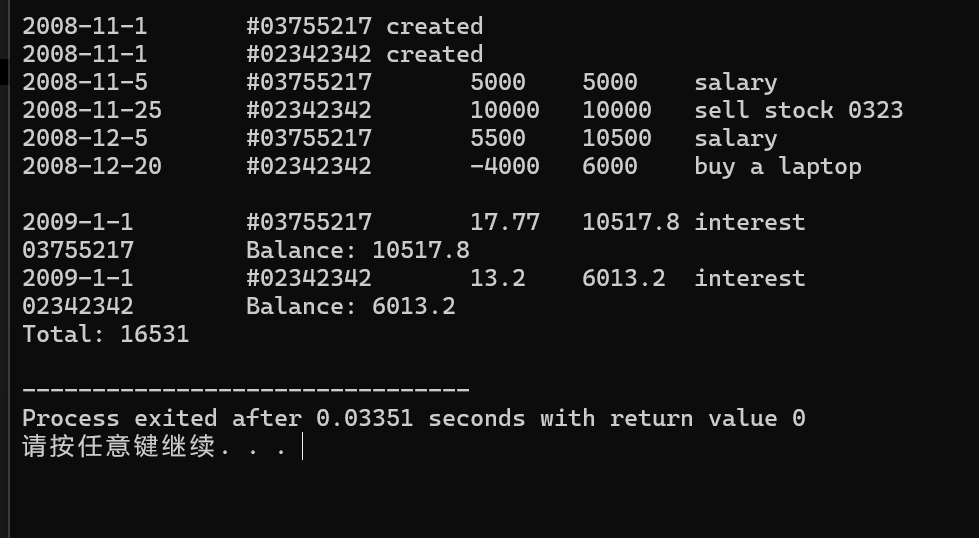实验3
任务1:
button.hpp:

1 #pragma once 2 3 #include<iostream> 4 #include<string> 5 6 using std::string; 7 using std::cout; 8 9 class Button{ 10 public: 11 Button(const string &text); 12 string get_label() const; 13 void click(); 14 private: 15 string label; 16 }; 17 Button::Button(const string &text):label{text}{ 18 } 19 inline string Button::get_label() const { 20 return label; 21 } 22 23 void Button::click(){ 24 cout << "Button'" << label << "'clicked\n"; 25 }
window.hpp:

1 #pragma once 2 #include"button.hpp" 3 #include<vector> 4 #include<iostream> 5 6 using std::vector; 7 using std::cout; 8 using std::endl; 9 10 class window{ 11 public: 12 window(const string &win_title); 13 void display() const; 14 void close(); 15 void add_button(const string &label); 16 private: 17 string title; 18 vector<Button> buttons; 19 }; 20 window::window(const string &win_title):title{win_title}{ 21 buttons.push_back(Button("close")); 22 } 23 24 inline void window::display() const { 25 string s(40,'*'); 26 27 cout << s << endl; 28 cout << "window title:" << title << endl; 29 cout << "It has " << buttons.size() << "buttons: " << endl; 30 for(const auto &i:buttons) 31 cout << i.get_label() << "button" << endl; 32 cout << s << endl; 33 } 34 35 void window::close(){ 36 cout << "close window '" << title << "'" << endl; 37 buttons.at(0).click(); 38 } 39 40 void window::add_button(const string &label){ 41 buttons.push_back(Button(label)); 42 }
task1.cpp:

1 #include"window.hpp" 2 #include<iostream> 3 4 using std::cout; 5 using std::cin; 6 7 void test(){ 8 window w1("new window"); 9 w1.add_button("maximize"); 10 w1.display(); 11 w1.close(); 12 } 13 14 int main(){ 15 cout << "用组合类模拟简单GUI:\n"; 16 test(); 17 }

问题1:自定义了Button类、Window类,使用到了标准库中的string类、vector类、iostream类;Button类和Window类存在组合关系。
问题2:不适合。Button类中click是修改目标状态,不适合加const,同时涉及到输出操作,不适合设置成inline;
Window类中display较长,不适合设置成inline;close会调用click,不适合加const,同时close相对较长,不适合设置成inline;
问题3:创建s字符串,并初始化为包含40个*的字符串。
任务2:
task2.cpp:

1 #include<iostream> 2 #include<vector> 3 4 using namespace std; 5 6 void output1(const vector<int> &v){ 7 for(auto &i:v) 8 cout << i << ", "; 9 cout << "\b\b \n"; 10 } 11 void output2(const vector<vector<int>> v){ 12 for(auto &i:v){ 13 for(auto &j:i) 14 cout << j << ", "; 15 cout << "\b\b \n"; 16 } 17 } 18 19 void test1(){ 20 vector<int> v1(5,42); 21 const vector<int> v2(v1); 22 23 v1.at(0) = -999; 24 cout << "v1: ";output1(v1); 25 cout << "v2: ";output1(v2); 26 cout << "v1.at(0) = " << v1.at(0) << endl; 27 cout << "v2.at(0) = " << v2.at(0) << endl; 28 } 29 30 void test2(){ 31 vector<vector<int>> v1{{1,2,3},{4,5,6,7}}; 32 const vector<vector<int>> v2(v1); 33 v1.at(0).push_back(-999); 34 cout << "v1:\n";output2(v1); 35 cout << "v2:\n";output2(v2); 36 37 vector<int> t1 = v1.at(0); 38 cout << t1.at(t1.size()-1) << endl; 39 40 const vector<int> t2 = v2.at(0); 41 cout << t2.at(t2.size()-1) << endl; 42 } 43 int main(){ 44 cout << "测试1:\n"; 45 test1(); 46 cout << "\n测试2:\n"; 47 test2(); 48 }

问题1:将v1初始化为42,42,42,42,42;复制构造v2,让v2初始化为v1的值;将v1内0号元素42替换成-999;
问题2:将v1初始化为{1,2,3},{4,5,6,7};复制构造v2,让v2初始化为v1的值,v2的值不可改变;让v1内{1,2,3}最末尾加上-999;
问题3:让t1等于{1,2,3,-999},然后输出t1中3号元素-999;让t2等于{1,2,3},然后输出2号元素3.
问题4:深复制 ;需要。
任务3:
vectorInt.hpp:

1 #pragma once 2 #include <iostream> 3 #include <cassert> 4 5 using std::cout; 6 using std::endl; 7 8 class vectorInt{ 9 public: 10 vectorInt(int n); 11 vectorInt(int n, int value); 12 vectorInt(const vectorInt &vi); 13 ~vectorInt(); 14 int& at(int index); 15 const int& at(int index) const; 16 vectorInt& assign(const vectorInt &v); 17 int get_size() const; 18 private: 19 int size; 20 int *ptr; 21 }; 22 23 vectorInt::vectorInt(int n): size{n}, ptr{new int[size]} { 24 } 25 26 vectorInt::vectorInt(int n, int value): size{n}, ptr{new int[size]} { 27 for(auto i = 0; i < size; ++i) 28 ptr[i] = value; 29 } 30 31 vectorInt::vectorInt(const vectorInt &vi): size{vi.size}, ptr{new int[size]} { 32 for(auto i = 0; i < size; ++i) 33 ptr[i] = vi.ptr[i]; 34 } 35 36 vectorInt::~vectorInt() { 37 delete [] ptr; 38 } 39 40 const int& vectorInt::at(int index) const { 41 assert(index >= 0 && index < size); 42 43 return ptr[index]; 44 } 45 46 int& vectorInt::at(int index) { 47 assert(index >= 0 && index < size); 48 49 return ptr[index]; 50 } 51 52 vectorInt& vectorInt::assign(const vectorInt &v) { 53 delete[] ptr; 54 size = v.size; 55 ptr = new int[size]; 56 for(int i = 0; i < size; ++i) 57 ptr[i] = v.ptr[i]; 58 return *this; 59 } 60 61 int vectorInt::get_size() const { 62 return size; 63 }
task3.cpp:

1 #include "vectorInt.hpp" 2 #include <iostream> 3 4 using std::cin; 5 using std::cout; 6 7 void output(const vectorInt &vi) { 8 for(auto i = 0; i < vi.get_size(); ++i) 9 cout << vi.at(i) << ", "; 10 cout << "\b\b \n"; 11 } 12 13 void test1() { 14 int n; 15 cout << "Enter n: "; 16 cin >> n; 17 vectorInt x1(n); 18 for(auto i = 0; i < n; ++i) 19 x1.at(i) = i*i; 20 cout << "x1: "; output(x1); 21 vectorInt x2(n, 42); 22 vectorInt x3(x2); 23 x2.at(0) = -999; 24 cout << "x2: "; output(x2); 25 cout << "x3: "; output(x3); 26 } 27 28 void test2() { 29 const vectorInt x(5, 42); 30 vectorInt y(10, 0); 31 cout << "y: "; output(y); 32 y.assign(x); 33 cout << "y: "; output(y); 34 cout << "x.at(0) = " << x.at(0) << endl; 35 cout << "y.at(0) = " << y.at(0) << endl; 36 } 37 38 int main() { 39 cout << "测试1: \n"; 40 test1(); 41 cout << "\n测试2: \n"; 42 test2(); 43 }
问题1:深复制;
问题2:能正确运行;在const方法中返回一个非const引用,可能导致编译错误;
问题3:可以改,但意义不大。返回*this可以确保获得对同一对象的引用;
问题4:标准库可以自动扩展和缩减容量,自定义需要手动管理内存,容易内存泄漏;标准库能够在多种情况下提供较好的性能,自定义性能取决于实现语句,可能会表现不佳。
任务4:
matrix.hpp:
1 #pragma once 2 #include <iostream> 3 #include <cassert> 4 5 using std::cout; 6 using std::endl; 7 8 class Matrix { 9 public: 10 Matrix(int n, int m); 11 Matrix(int n); 12 Matrix(const Matrix &x); 13 ~Matrix(); 14 15 void set(const double *pvalue); 16 void clear(); 17 const double& at(int i, int j) const; 18 double& at(int i, int j); 19 int get_lines() const; 20 int get_cols() const; 21 void display() const; 22 23 private: 24 int lines; 25 int cols; 26 double *ptr; 27 }; 28 29 Matrix::Matrix(int n, int m) : lines(n), cols(m) { 30 ptr = new double[n * m](); 31 } 32 33 Matrix::Matrix(int n) : Matrix(n, n) {} 34 35 Matrix::Matrix(const Matrix &x) : lines(x.lines), cols(x.cols) { 36 ptr = new double[lines * cols]; 37 for (int i = 0; i < lines * cols; ++i) { 38 ptr[i] = x.ptr[i]; 39 } 40 } 41 42 Matrix::~Matrix() { 43 delete[] ptr; 44 } 45 46 void Matrix::set(const double *pvalue) { 47 for (int i = 0; i < lines; ++i) { 48 for (int j = 0; j < cols; ++j) { 49 ptr[i * cols + j] = pvalue[i * cols + j]; 50 } 51 } 52 } 53 54 void Matrix::clear() { 55 for (int i = 0; i < lines * cols; ++i) { 56 ptr[i] = 0.0; 57 } 58 } 59 60 const double& Matrix::at(int i, int j) const { 61 assert(i >= 0 && i < lines && j >= 0 && j < cols); 62 return ptr[i * cols + j]; 63 } 64 65 double& Matrix::at(int i, int j) { 66 assert(i >= 0 && i < lines && j >= 0 && j < cols); 67 return ptr[i * cols + j]; 68 } 69 70 int Matrix::get_lines() const { 71 return lines; 72 } 73 74 int Matrix::get_cols() const { 75 return cols; 76 } 77 78 void Matrix::display() const { 79 for (int i = 0; i < lines; ++i) { 80 for (int j = 0; j < cols; ++j) { 81 cout << at(i, j) << " "; 82 } 83 cout << endl; 84 } 85 }
task4.cpp:

1 #include "matrix.hpp" 2 #include <iostream> 3 #include <cassert> 4 5 using std::cin; 6 using std::cout; 7 using std::endl; 8 9 const int N = 1000; 10 11 void output(const Matrix &m, int index) { 12 assert(index >= 0 && index < m.get_lines()); 13 for(auto j = 0; j < m.get_cols(); ++j) 14 cout << m.at(index, j) << ", "; 15 cout << "\b\b \n"; 16 } 17 18 void test1() { 19 double x[1000] = {1, 2, 3, 4, 5, 6, 7, 8, 9}; 20 int n, m; 21 cout << "Enter n and m: "; 22 cin >> n >> m; 23 Matrix m1(n, m); 24 m1.set(x); 25 Matrix m2(m, n); 26 m2.set(x); 27 Matrix m3(2); 28 m3.set(x); 29 cout << "矩阵对象m1: \n"; m1.display(); cout << endl; 30 cout << "矩阵对象m2: \n"; m2.display(); cout << endl; 31 cout << "矩阵对象m3: \n"; m3.display(); cout << endl; 32 } 33 34 void test2() { 35 Matrix m1(2, 3); 36 m1.clear(); 37 const Matrix m2(m1); 38 m1.at(0, 0) = -999; 39 cout << "m1.at(0, 0) = " << m1.at(0, 0) << endl; 40 cout << "m2.at(0, 0) = " << m2.at(0, 0) << endl; 41 cout << "矩阵对象m1第0行: "; output(m1, 0); 42 cout << "矩阵对象m2第0行: "; output(m2, 0); 43 } 44 45 int main() { 46 cout << "测试1: \n"; 47 test1(); 48 cout << "测试2: \n"; 49 test2(); 50 }

任务5:
user.hpp:
1 #pragma once 2 3 #include<iostream> 4 #include<string> 5 #include<vector> 6 7 using namespace std; 8 9 class User { 10 public: 11 User(const string &name, const string &password = "123456", const string &email = ""); 12 void set_email(); 13 void change_password(); 14 void display() const; 15 private: 16 string name; 17 string password; 18 string email; 19 }; 20 21 User(const string &name, const string &password = "123456", const string &email = "") 22 : name(name), password(password), email(email) {} 23 24 void set_email() { 25 cout << "Enter email address: "; 26 cin >> email; 27 cout << "email is set successfully..." << endl; 28 } 29 30 void change_password() { 31 string old_password; 32 cout << "Enter old password: "; 33 cin >> old_password; 34 int i = 1; 35 while (i < 3) { 36 if (old_password == password) { 37 string new_password; 38 cout << "Enter new password: "; 39 cin >> new_password; 40 password = new_password; 41 cout << "eew password is set successfully..." << endl; 42 return; 43 } else { 44 cout << "password input error. Please re-enter again: "; 45 cin >> old_password; 46 i++; 47 } 48 } 49 cout << "password input error. Please try after a while." << endl; 50 } 51 52 void display() const { 53 cout << "name: " << name << endl; 54 cout << "pass: " << string(password.length(), '*') << endl; 55 cout << "email: " << email << endl; 56 }
task5.cpp:

1 #include "user.hpp" 2 #include <iostream> 3 #include <vector> 4 #include <string> 5 6 using std::cin; 7 using std::cout; 8 using std::endl; 9 using std::vector; 10 using std::string; 11 12 void test() { 13 vector<User> user_lst; 14 15 User u1("Alice", "2024113", "Alice@hotmail.com"); 16 user_lst.push_back(u1); 17 cout << endl; 18 19 User u2("Bob"); 20 u2.set_email(); 21 u2.change_password(); 22 user_lst.push_back(u2); 23 cout << endl; 24 25 User u3("Hellen"); 26 u3.set_email(); 27 u3.change_password(); 28 user_lst.push_back(u3); 29 cout << endl; 30 31 cout << "There are " << user_lst.size() << " users. they are: " << endl; 32 for(auto &i: user_lst) { 33 i.display(); 34 cout << endl; 35 } 36 } 37 38 int main() { 39 test(); 40 }

任务6:
date.h:

1 #ifndef __DATE_H__ 2 #define __DATE_H__ 3 4 class Date { 5 private: 6 int year; 7 int month; 8 int day; 9 int totalDays; 10 public: 11 Date(int year, int month, int day); 12 int getYear() const { return year; } 13 int getMonth() const { return month; } 14 int getDay() const { return day; } 15 int getMaxDay() const; 16 bool isLeapYear() const { 17 return year % 4 == 0 && year % 100 != 0 || year % 400 == 0; 18 } 19 void show() const; 20 int distance(const Date& date) const { 21 return totalDays - date.totalDays; 22 } 23 }; 24 #endif //__DATE_H__
date.cpp:

1 #include "date.h" 2 #include <iostream> 3 #include <cstdlib> 4 using namespace std; 5 6 namespace { 7 const int DAYS_BEFORE_MONTH[] = { 0, 31, 59, 90, 120, 151, 181, 212, 243, 273, 304, 334, 365 }; 8 } 9 Date::Date(int year, int month, int day) : year(year), month(month), day(day) { 10 if (day <= 0 || day > getMaxDay()) { 11 cout << "Invalid date."; 12 show(); 13 cout << endl; 14 exit(1); 15 } 16 int years = year - 1; 17 totalDays = years * 365 + years / 4 - years / 100 + years / 400 18 + DAYS_BEFORE_MONTH[month-1] + day; 19 if (isLeapYear() && month > 2) totalDays++; 20 } 21 int Date::getMaxDay()const { 22 if (isLeapYear() && month == 2) { 23 return 29; 24 } 25 else { 26 return DAYS_BEFORE_MONTH[month] - DAYS_BEFORE_MONTH[month - 1]; 27 } 28 } 29 void Date::show() const { 30 cout << getYear() << '-' << getMonth() << '-' << getDay(); 31 }
account.h:

1 #ifndef __ACCOUNT_H__ 2 #define __ACCOUNT_H__ 3 #include "date.h" 4 #include <string> 5 class SavingsAccount { 6 private: 7 std::string id; 8 double balance; 9 double rate; 10 Date lastDate; 11 double accumulation; 12 static double total; 13 void record(const Date& date, double amount, const std::string& desc); 14 void error(const std::string& msg) const; 15 double accumulate(const Date& date) const { 16 return accumulation + balance * date.distance(lastDate); 17 } 18 public: 19 SavingsAccount(const Date& date, const std::string& id, double rate); 20 const std::string& getId() const { return id; } 21 double getBalance() const { return balance; } 22 double getRate() const { return rate; } 23 static double getTotal() { return total; } 24 void deposit(const Date& date, double amount, const std::string& desc); 25 void withdraw(const Date& date, double amount, const std::string& desc); 26 void settle(const Date& date); 27 void show() const; 28 }; 29 #endif // ACCOUNT_H
account.cpp:

1 #include "account.h" 2 #include <cmath> 3 #include <iostream> 4 using namespace std; 5 double SavingsAccount::total = 0; 6 SavingsAccount::SavingsAccount(const Date& date, const std::string& id, double rate):id(id), balance(0), rate(rate), lastDate(date), accumulation(0){ 7 date.show(); 8 cout<< "\t#" << id << " created" << endl; 9 } 10 void SavingsAccount::record(const Date& date, double amount, const std::string& desc) { 11 accumulation = accumulate(date); 12 lastDate = date; 13 amount = floor(amount * 100 + 0.5) / 100; 14 balance += amount; 15 total += amount; 16 date.show(); 17 cout << "\t#" << id << "\t" << amount << "\t" << balance << "\t" << desc << endl; 18 } 19 void SavingsAccount::error(const std::string& msg) const { 20 cout << "Error(#" << id << "): " << msg << endl; 21 } 22 void SavingsAccount::deposit(const Date& date, double amount, const std::string& desc) { 23 record(date, amount, desc); 24 } 25 void SavingsAccount::withdraw(const Date& date, double amount, const std::string& desc) { 26 if (amount > getBalance()) 27 error("not enough money"); 28 else 29 record(date, -amount, desc); 30 } 31 void SavingsAccount::settle(const Date& date) { 32 double interest = accumulate(date) * rate /date.distance(Date(date.getYear()-1,1,1)); 33 if (interest != 0) 34 record(date, interest, "interest"); 35 accumulation = 0; 36 } 37 void SavingsAccount::show() const { 38 cout << id << "\tBalance: " << balance; 39 }
6_25.cpp:

1 #include "account.h" 2 #include <iostream> 3 using namespace std; 4 5 int main() { 6 Date date(2008, 11, 1); 7 SavingsAccount accounts[] = { 8 SavingsAccount(date, "03755217", 0.015), 9 SavingsAccount(date, "02342342", 0.015) 10 }; 11 const int n = sizeof(accounts) / sizeof(SavingsAccount); //账户总数 12 accounts[0].deposit(Date(2008, 11, 5), 5000, "salary"); 13 accounts[1].deposit(Date(2008, 11, 25), 10000, "sell stock 0323"); 14 accounts[0].deposit(Date(2008, 12, 5), 5500, "salary"); 15 accounts[1].withdraw(Date(2008, 12, 20), 4000, "buy a laptop"); 16 cout << endl; 17 for (int i = 0; i < n; i++) { 18 accounts[i].settle(Date(2009, 1, 1)); 19 accounts[i].show(); 20 cout << endl; 21 } 22 cout << "Total: " << SavingsAccount::getTotal() << endl; 23 return 0; 24 }

总结:
浅复制:浅复制创建一个新对象,但它并不会递归地复制对象内部的所有嵌套对象。相反,浅复制会复制对象的引用;
深复制:深复制则会创建一个新对象,并递归地复制所有嵌套对象。这样,新对象与原始对象之间完全独立,修改新对象中的任何内容都不会影响原始对象。





